Watch: Part 2 Of Our Conversation with American Aquarium’s BJ Barnham
“Call out the bad when you see it!” That’s what American Aquarium frontman BJ Barnham does during Part 2 of this 13th Floor interview.
Watch or read as BJ discusses recording their album Lamentations with producer Shooter Jennings, how he re-built his band and how the recent events in the US have affected American Aquarium.
Follow American Aquarium: WEBSITE FACEBOOK SPOTIFY INSTAGRAM TWITTER YOUTUBE
If you missed Part 1, read it here: https://wp.me/p7JasK-xOi
Here’s Part 2. Watch the Zoom video and/or read the transcription below:
M: Now the one person we haven’t spoken about, the extra band member, the seventh band member is Shooter Jennings. And there’s some story about he wasn’t your original choice as a producer and he kind of came in at the last minute is that what happened?
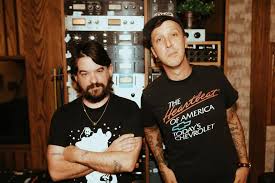
BJ: Yeah. So we originally…every record I write, I write it with a very specific place in mind to record it. I know that sounds weird. Like I wrote Things Change, I knew that I was gonna make that record in Tulsa, Oklahoma. We had every intent…we were doing it with John Fullbright. I knew that we were going to go to The Church which was Leon Russell’s old studio there in Tulsa. We were gonna make this record and then we got to Tulsa and realised that the Church had about two more months of renovations before it was gonna be open so we had to pivot and Fullbright had already had a really great studio that just so happened to be owned by the Hanson Brothers the pop band from the late 90s, and so we did it and they had this amazing state of the art studio right beside Cain’s Ballroom and the Brady Arts District down in Tulsa.
So we made that record and one of the records before we did with Jason Isbell and we went to Muscle Shoals, Alabama, where he’s from, and cut a record in one of the most iconic music towns in the States. So for this record, I knew that I wanted to make this record in Memphis, Tennessee. I knew that I wanted to make this record…this is a record about watching a country fall apart and when it comes to musical legacy cities that fell apart in the 90s, Memphis is one of those towns in the fifties and sixties and seventies that was what anything you listened to…it had some kind of root in Memphis. It was this kind of intersection of everything. I wanted to make a record in Memphis to we hired, we signed on with a really hot producer in Memphis, we went through all of the steps and then about two, three weeks before we were supposed to go into the studio, his management calls us and lets us know that they had a gut feeling that it was a bad fit. They didn’t like the songs. They didn’t think the songs were, I guess, good enough.
M: Do you think they were afraid of what you were singing about rather than the quality of the song?
BJ: No I think they agreed with whatever it was. A lot of these songs I brought to the table as demos and I tried to explain that, I got a six piece rock ‘n’ roll band that’s gonna put some muscle on these songs, you don’t have to worry about them just being ten acoustic songs. But at the end of the day if somebody doesn’t have…if they don’t believe in the songs as much as I do, I don’t really want to work with them and so we punted. We broke ties and here we are. We had the studio space rented, we had hotels booked, we had flights booked and we scrapped it. So I spent probably two weeks as an artist, trying, as an artist when somebody you respect that you want to work with, that you sought out to work with tells you that they don’t believe in the songs, you start questioning the things you created, you start questioning the songs themselves. I played him Me + Mine, I played him Better South, I played him Long Haul and Luckier You Get and Starts With You.
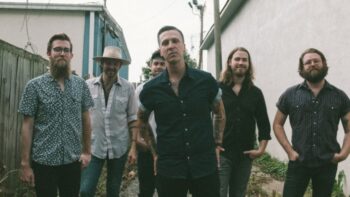 I played him those songs on acoustic guitar and at the end of the day you sit back and you start questioning are these songs bad? Are they not good enough? If somebody who I really respect doesn’t believe in them. maybe I should start over. And my agent called my booking agent, he called and said, ‘Hey have you thought about working with Shooter Jennings?’ And at this point, Shooter’s coming off of the Brandi Carlile wins at the Grammys, he’s coming off the Tanya Tucker nominations which would eventually go on to win more Grammys this past year. And I was like sure, Shooter’s probably the hottest producer in the country right now but I don’t know him, I can’t get in touch with him. He’s like, well I also am his booking agent and I was like cool can you send him some demos? So the same demos that I sent to this other guy, I sent to Shooter and Shooter messaged me about an hour later and said, ‘Hey, I would love to make this record if we can make time’. So we carved out some time in early December of ‘19 and we flew to Los Angeles because I was like, ‘I want to make it in Memphis’, he’s like, ‘Have you thought about making a southern California record?’ He’s like, ‘Because I’m hearing a lot of Petty on these songs and Petty ain’t from Memphis’. He’s like, ‘How about we make like a Southern California record?’
I played him those songs on acoustic guitar and at the end of the day you sit back and you start questioning are these songs bad? Are they not good enough? If somebody who I really respect doesn’t believe in them. maybe I should start over. And my agent called my booking agent, he called and said, ‘Hey have you thought about working with Shooter Jennings?’ And at this point, Shooter’s coming off of the Brandi Carlile wins at the Grammys, he’s coming off the Tanya Tucker nominations which would eventually go on to win more Grammys this past year. And I was like sure, Shooter’s probably the hottest producer in the country right now but I don’t know him, I can’t get in touch with him. He’s like, well I also am his booking agent and I was like cool can you send him some demos? So the same demos that I sent to this other guy, I sent to Shooter and Shooter messaged me about an hour later and said, ‘Hey, I would love to make this record if we can make time’. So we carved out some time in early December of ‘19 and we flew to Los Angeles because I was like, ‘I want to make it in Memphis’, he’s like, ‘Have you thought about making a southern California record?’ He’s like, ‘Because I’m hearing a lot of Petty on these songs and Petty ain’t from Memphis’. He’s like, ‘How about we make like a Southern California record?’
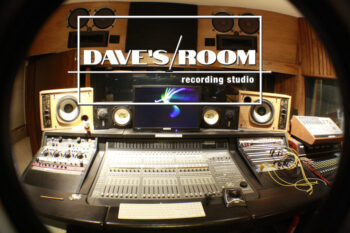 So we went out and it was a really great experience cause I never really thought about making a Laurel Canyon Southern California record. And then we hold up in a place called Dave’s Room which actually was Tom Petty’s engineer’s studio he built so the guy that engineered Wildflowers, here we are in his studio and we had the record, Lucinda recorded there, Dylan recorded there so it was like this kind of extremely vibey place. You could walk in and you could feel the magic. You were like, ‘Ok, this is also gonna be a cool place to make a record’. And we sat down and like I said, ten days later we made a record and we could not have made that record in Memphis. We could not have made that record with anyone else other than Shooter Jennings.
So we went out and it was a really great experience cause I never really thought about making a Laurel Canyon Southern California record. And then we hold up in a place called Dave’s Room which actually was Tom Petty’s engineer’s studio he built so the guy that engineered Wildflowers, here we are in his studio and we had the record, Lucinda recorded there, Dylan recorded there so it was like this kind of extremely vibey place. You could walk in and you could feel the magic. You were like, ‘Ok, this is also gonna be a cool place to make a record’. And we sat down and like I said, ten days later we made a record and we could not have made that record in Memphis. We could not have made that record with anyone else other than Shooter Jennings.
M: So what did he bring to the process?
BJ: He believed in it as much as we did. And again, like we were talking about band members, it’s just as important, if not more important for a producer to see the same things in your songs that you see in your song. To take three chords on an acoustic guitar and some words and see a song like Me + Mine in your head. I told him straight up, I was like I see this as being like this really quiet almost like a ruination like this folk song and then I see it just, the anger and the despair exploding at the end of it. He’s like, ‘Oh man I totally see that’. He’s like it’s gonna be like a Pink Floyd noise jam at the end and then we did it and we both looked at each other and were like we both heard this in our heads. Shooter, again, was a seventh member in the studio. He brought such a positive energy. Sometimes when people bring up bad ideas, they immediately get dismissed as bad ideas. And the danger of dismissing a bad idea is it might prevent someone from bringing a good idea to the table because they think that it might be another bad idea. So every single idea that my guys brought to the table, we at least tried it. We at least went through the motions and tried to see if it would work. And if it didn’t work, you could tell it didn’t work and the person would be like ok.
But nobody got dejected, nobody got down and out. It was like this endless well of creativity for ten days. Everybody was just throwing out ideas and if they got rejected, great let’s pivot and do this, let’s do this, and Shooter really facilitated that. He was really great at bringing the best out of people. And I know that sounds cheesy and cliché for a music producer, but in my eight records I’ve made, I’ve never had that. I’ve never had someone that was just endlessly optimistic about no keep trying, keep shootin’, keep shootin’, keep shootin’. And he was excited. When you go into the control room and you’re seeing your producer standing at the glass fist pumping along with the singalongs…and it’s not just some buddy of yours that went to Full Sail for four years and now has a studio, it’s Shooter Jennings like, he comes from decent stock. When your parents are two of the four original outlaws, you get a voice in country music no matter what. You have the pedigree to do whatever you want to do. But that’s the fun part about Shooter, is he could’ve easily cashed in, just did the outlaw thing and rode it off into the sunset. He could have. But instead he is such an endless well of musical knowledge in every genre and he brings that to the table. It’s not just let’s go in there with a train beat and a Telecaster and make a country record. He’s seen that before first hand. He knows exactly now to do that and he can do it well, he learned from one of the greatest people ever to have a train beat and Telecaster.
But he pushes it, he’s like let’s add a Latin feel to this. Like if you listen to the song Brightleaf + Burley. We went into that song thinking it was gonna be a straight traditional bluegrass kind of thing, we’re gonna bring in mandolin and fiddle and it’s gonna be kind of this Appalachian battle cry for the legalisation of marijuana. And he was like how about we make it almost like a Latin Paul Simon kind of feel at the beginning that still drives the whole song but then we add these atmospheric guitars over top of that acoustic bluegrass picking. You’re like, ‘That’s not gonna work, that’s three completely different styles of music’. And then you listen to it and you’re like it’s one of the stand out tracks on the record. It’s like ok, that works and we would have never have seen that coming if it hadn’t been for someone like Shooter who’s like let’s try the weirdest combinations of things just to see if it works.
M: The fact of the matter is, it’s a relatively new band at this point coming in with a new producer…things could’ve gone horribly wrong.
BJ: Things should have went horribly wrong. Nobody, especially in my experience with my experience, nobody goes into that situation with a brand new band. You’ve gotta think two of those guys joined in June. They’ve been in the band less than six months. We were just getting to know what you like to eat after a show. We went into the studio and literally it was…and I told him, I was like I can’t believe how fun this is cause for those that are un-doctrinated with studio time, it’s extremely expensive. Period. But when you’re going into a studio in Southern California with a Grammy award winning producer, it’s extremely expensive. And so when you’re paying by the hour for all of these services, band, producer, engineer, catering, the studio time, it becomes overwhelming sometimes. You put this added pressure on yourself to be like Ok, I’m an artist I have to create but I have to create under a clock, I have to create under a microscope and it puts a lot of pressure that sometimes it takes a day or two to forget the cameras are on, to fall back into that artistic zone.
That space didn’t exist here. We went in, set up stuff and immediately started creating art which is unheard of, especially when you’re doing it with some people who literally by sheer definition are strangers. I had only met Shooter once before that. He was on tour with Gun ‘n Roses. That’s the kind of music. Let me just say that again, that’s how ridiculous I feel sometimes when I’m talking about Shooter cause I just said that so nonchalantly and yeah, I had much with him when we was on tour with Guns ‘n Roses. That was the only time I’d ever met him. I drove down to Charlotte and had lunch with him and we talked about the record, we talked about the demos just to see if we could vibe and we totally did. You’re going to a studio with somebody you had much with and you’re like, ‘I’m gonna pay you some money and we’re gonna try to create something special’. It’s hard to do, especially with strangers like I know bands that have been together ten years that couldn’t have went in and made that record we made.
M: So the band must have come out of there,…you said this was recorded in December. It’s now July, we’ve been in a pandemic for god knows how long, you must not have had many shows to do after that, you guys must be itching to play.
BJ: We probably had ten shows in January. Our last show together was January 30th. If I hadn’t known the pandemic was coming, I would have played every day of February. But we took off because we wanted to give the old supply and demand. If we don’t play any shows until after the record comes out, people will not have seen us for five months or we might get some people to come to the show etcetera…the business side of being in the music business. And so we didn’t play any. January 30th was the last time I got to sit down with my band but that month of January where we were playing the stuff from our old catalogue plus the stuff from our new catalogue, we were cooking.
There’s an energy that’s hard to describe when you’re sitting on something special and you know you’re sitting on something special and nobody else has any idea what you’re sitting on. We’ve known since December that these songs existed. We’ve known since December that people were gonna attach to these songs pretty quickly. And so occasionally we’d throw one out in the live set in January and just watch the crowd like, ‘what was that?’ Throwing a song like Me + Mine out to open a show when people think they’re just gonna get the hits and you throw a seven and a half minute jam in, they’re like one, what was that? Two, where can I get it? Three, what do you mean it’s not available until six months from now? We were cooking man, we were cooking with gas and we were so stoked to get back because we had the biggest tour we’ve ever had planned. We had almost four months in the States, we were coming down to Australia for the first time, we hadn’t announced it yet, we had a full European tour and a UK tour. In every sense of the word, we had a world tour planned for the rest of the year. And here we are looking at spring and summer of 2021 because us Americans, we’re a very, very selfish breed of people and we think that global pandemics don’t apply to us after ten weeks and that medicine and science don’t know what they’re talking about. It’s nonsense.
So I try to tell people, I’m like the more you guys act like children who aren’t getting their way in the supermarket, the longer that I’m not able to play these songs in front of people the way they’re supposed to be played in front of people. These songs are meant to be consumed on a nightly basis with a thousand people in front of me and me feeding off them, them feeding off of me. And its just not gonna happen until either realistically, vaccine is the only way we’re gonna get back to work any time soon and the minimum for that is eighteen months so you’re talking next summer before there’s a possible, through trials and approval for a vaccine to actually be readily available. And until that happens, I’m not willing to put me or my family or my band’s family or my fans’ family at risk for shows.
M: So I’ve got one more question for you, could be the hardest one, speaking as a Southerner, after this is over, if it’s over relatively soon, is it going be a better place? Is it gonna be a better South or a better US? What’s your feeling?
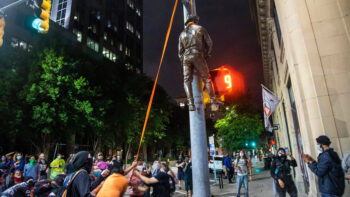 BJ: I can already tell you, we ripped down a lot of those Confederate monuments. We call them participation trophies. There’s a lot of people in the South that have had those things up for a very long time and for the folks down under, to explain to you…the Civil War was in the 1860s, it ended 1865. So if you’re gonna honour your dead for a historical purpose, should you have put those up in 1866, 1867, 1868. Those confederate monuments were erected in the fifties in the south. They were not erected as historical markers, they were erected to intimidate and remind people of colour that they were lesser than. There was no historical purposes for these, it was all a ruse to scare people into staying in place.
BJ: I can already tell you, we ripped down a lot of those Confederate monuments. We call them participation trophies. There’s a lot of people in the South that have had those things up for a very long time and for the folks down under, to explain to you…the Civil War was in the 1860s, it ended 1865. So if you’re gonna honour your dead for a historical purpose, should you have put those up in 1866, 1867, 1868. Those confederate monuments were erected in the fifties in the south. They were not erected as historical markers, they were erected to intimidate and remind people of colour that they were lesser than. There was no historical purposes for these, it was all a ruse to scare people into staying in place.
You’ve gotta think, late fifties, early sixties, we saw a rise in our black brothers and sisters 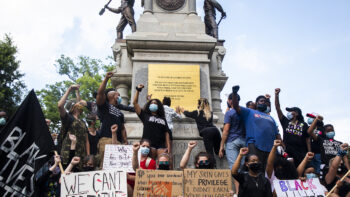 standing up for themselves, standing up and saying we’re not taking this anymore. That was when the civil rights movement really got cooking and those were erected in every downtown in small American cities in the south to remind people it’s like, ‘it could be worse, remember, remember’. And so those things have lasted this long and we’re finally, like yesterday in Raleigh they bulldozed it. They finally bulldozed the, like, protesters ripped a lot of it down but we bulldozed it and it’s not there anymore. And so there’s a lot in that song, it’s down here we’re still fighting for all the wrong reasons. Old men still defend these monuments to try treason and the one that I wrote that song about, the giant 70 foot monument in downtown Raleigh is not there anymore. So yes, I see some progress.
standing up for themselves, standing up and saying we’re not taking this anymore. That was when the civil rights movement really got cooking and those were erected in every downtown in small American cities in the south to remind people it’s like, ‘it could be worse, remember, remember’. And so those things have lasted this long and we’re finally, like yesterday in Raleigh they bulldozed it. They finally bulldozed the, like, protesters ripped a lot of it down but we bulldozed it and it’s not there anymore. And so there’s a lot in that song, it’s down here we’re still fighting for all the wrong reasons. Old men still defend these monuments to try treason and the one that I wrote that song about, the giant 70 foot monument in downtown Raleigh is not there anymore. So yes, I see some progress.
M: That’s definitely progress.
BJ: I see thousands of people black, white, men, women marching on every small town in America saying that we are not going to stand for this anymore. We’re not gonna stand for this inequality. And yeah, I see change happening. I don’t think it’s gonna be overnight, I don’t think in 2020 the election’s gonna happen and then all of a sudden sunshine and rainbows and pots of gold are gonna pop out, I don’t think it’s gonna be a quick fix, but I think part of fixing a problem is at least admitting the problem exists. I’m not asking Southerners to be ashamed of their history, I’m asking for accountability for your history, acknowledgement of the real history. That’s what so many people think.
So many people think equality is giving up something and so you have less. You don’t lose anything from giving someone else equality. You don’t have to give up any of your pie for someone else to have pie. That’s the hard part for folks to understand is they think it’s a more than less than and that’s not what equality is. And so I think that you have a wave…what is it, somebody posted a really great stat, it was there’s gonna be almost four million people in the county right now who are seventeen that will be eighteen by November. That’s a cool number to have because we’re starting to see racism and hatred in this country. It’s such an antiquated, generational thing and so obviously, anybody that lived through segregation was taught racism at a very early age in the South and you don’t just un-teach that without proper education and remorse. That’s the kind of deep-rooted evil that stays with you and then if it’s not checked or fixed, it gets passed down to the next generation of kids, including my generation. And it’s how I was raised, I wasn’t raised blatant racism, but I was raised very much in a systematic racism. It was very real.
So it takes leaving a small town. Someone like me who has been to nineteen countries now and I’ve played music for a living, I’ve been all over our country, I’ve seen every state, every city, every big city, I can’t say I’m every county or city in the States but I’ve traveled a lot over the last fifteen years and it’s made me a better person. Going off for a secondary education was also important. Going to a university, learning about other cultures, learning the fallacies of the stereotypes my parents taught me as a kid. Learning that it’s not true, that there’s nothing wrong with black people, there’s nothing wrong with gay people, there’s nothing wrong with people that are different than you, it’s just about opening up your ears, shutting your mouth and trying to find that common ground.
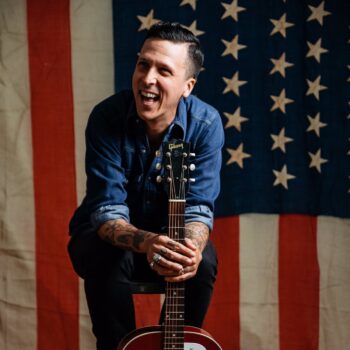 I feel like most kids who went and got secondary educations and have traveled at least a little bit are better people for it. I think that’s an easy way to kill intolerance is just travel a little bit. Mark Twain has a really great quote about it, it’s important and I think that we’re starting to see as the next generation of my family. I know that my daughter’s never going hear any of that stuff. I know that it ends with me. I know that that exposure to a deep rooted hate for other people based on how they look or how they feel ends with me. That’s change. That’s a better South. Knowing that my daughter’s going to grow up and not have any of those, cause like I said, I like to think that over the course of thirty-six years now on this planet, I strive every day to be a better person tomorrow than I was today and I still fall short of perfect every single day. But I think that that ability to admit your wrongs, the ability to be willing to learn is what’s gonna propel us forward and I think that’s what you’re seeing a lot of in the south, you’re seeing a lot of people raise their hand and say we don’t have it right, but I’m willing to hear how to make it right, I’m willing to change, I’m willing to speak up, I’m willing to facilitate the change that needs to happen and you’re still going to have people that stand up against it.
I feel like most kids who went and got secondary educations and have traveled at least a little bit are better people for it. I think that’s an easy way to kill intolerance is just travel a little bit. Mark Twain has a really great quote about it, it’s important and I think that we’re starting to see as the next generation of my family. I know that my daughter’s never going hear any of that stuff. I know that it ends with me. I know that that exposure to a deep rooted hate for other people based on how they look or how they feel ends with me. That’s change. That’s a better South. Knowing that my daughter’s going to grow up and not have any of those, cause like I said, I like to think that over the course of thirty-six years now on this planet, I strive every day to be a better person tomorrow than I was today and I still fall short of perfect every single day. But I think that that ability to admit your wrongs, the ability to be willing to learn is what’s gonna propel us forward and I think that’s what you’re seeing a lot of in the south, you’re seeing a lot of people raise their hand and say we don’t have it right, but I’m willing to hear how to make it right, I’m willing to change, I’m willing to speak up, I’m willing to facilitate the change that needs to happen and you’re still going to have people that stand up against it.
M: Oh yeah, well that’s given.
BJ: Those numbers continue to drop, those numbers continue to drop. And so the easiest answer for your question is yes, I’m already seeing a better South. This record’s been out two months and I already see things changing from that record already. So It’s a start. We’re not gonna fully…racism’s not something that you can completely eradicate. It’s so deep rooted and so clingy, it takes generations of cleansing for that to go away, cultural cleansing but we’ll see. I feel good about where I’m at right now, I feel good about where the South’s at and I’m lucky. North Carolina is one of the more progressive Southern states. We always joke, we’re not Alabama, we’re not Mississippi, we’re North Carolina, we’re a relatively progressive…we’re the only Southern state that voted for Obama in 2008. So I see these glimmers of hope, I see these glimmers of Ok, we’re not there yet, but North Carolina’s definitely on the track to prove that the South’s not just a bunch of ignorant hate mongers.
M: Well thank you very much, that was fantastic talking to you. Thank you again for the record.
BJ: Oh for sure.
M: Hopefully you’ll get on stage soon and get it out of your system cause it’s gotta be driving you nuts.
BJ: It’s driving me insane. I can’t wait to get back to it but again, all in due time. It’s about being smart, proactive, doing what we can to keep this thing down here in the States even if nobody else is gonna do it. Keeping me and my family safe until it passes by, till people wake up and realise that it’s not just something that goes away if you ignore it. We’ll see. Like I said, I love where I’m from, but you gotta be able to call out the bad when you see it and we’re definitely not doing the right stuff right now.
M: Thank you again and have a nice day, it’s like ten o’clock in the morning there right?
BJ: Yeah, it’s almost ten. We’re bright and early here, I’m sure you guys are winding down.
M: It’s almost two in the morning here.
BJ: Oh, wow I did not even realise that it was that late, I apologise.
M: No, there’s no reason to apologise.
BJ: I cooked breakfast, I went for a run, my morning is just getting started.
M: Well good on ya, have a good day.
BJ: Heck yeah, thanks for taking the time.